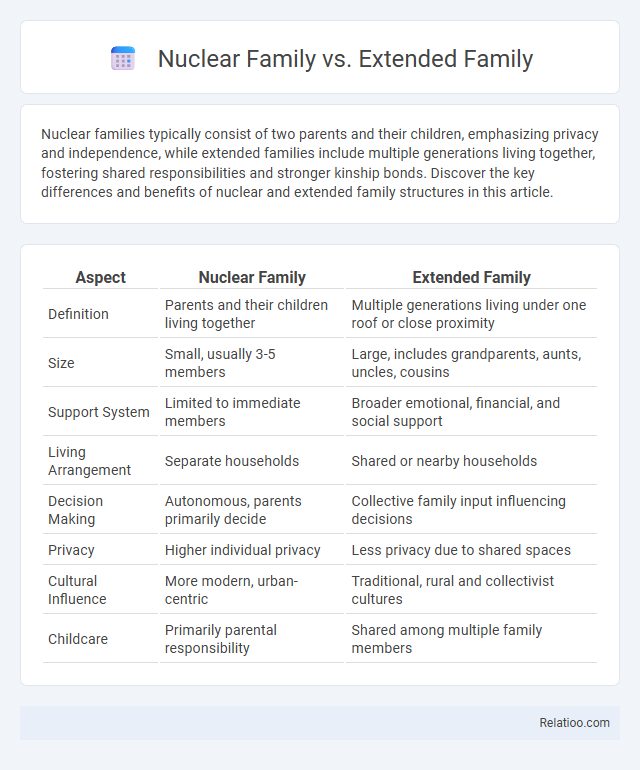Nuclear families typically consist of two parents and their children, emphasizing privacy and independence, while extended families include multiple generations living together, fostering shared responsibilities and stronger kinship bonds. Discover the key differences and benefits of nuclear and extended family structures in this article.
Table of Comparison
| Aspect | Nuclear Family | Extended Family |
|---|---|---|
| Definition | Parents and their children living together | Multiple generations living under one roof or close proximity |
| Size | Small, usually 3-5 members | Large, includes grandparents, aunts, uncles, cousins |
| Support System | Limited to immediate members | Broader emotional, financial, and social support |
| Living Arrangement | Separate households | Shared or nearby households |
| Decision Making | Autonomous, parents primarily decide | Collective family input influencing decisions |
| Privacy | Higher individual privacy | Less privacy due to shared spaces |
| Cultural Influence | More modern, urban-centric | Traditional, rural and collectivist cultures |
| Childcare | Primarily parental responsibility | Shared among multiple family members |
Introduction to Family Structures
Nuclear family refers to a household consisting of two parents and their children, promoting close-knit relationships and individual privacy. Extended family includes multiple generations living together or in close proximity, emphasizing collective support and shared responsibilities. Family systems theory analyzes interactions and patterns within these family structures, highlighting their influence on individual behavior and social dynamics.
Defining Nuclear Family
The nuclear family consists of two parents and their children living together as a single unit, emphasizing a compact household structure that supports emotional and economic stability. In contrast, the extended family encompasses multiple generations and relatives cohabiting or maintaining close ties, promoting shared resources and cultural continuity. Your understanding of these family systems highlights how the nuclear family prioritizes individual privacy and direct parental involvement.
Defining Extended Family
The extended family includes multiple generations living together or maintaining close connections, such as grandparents, aunts, uncles, and cousins, beyond the immediate parents and their children found in a nuclear family. This structure often supports shared responsibilities, collective decision-making, and cultural continuity within households or communities. Extended family systems play a significant role in social support networks, economic cooperation, and intergenerational caregiving.
Key Differences Between Nuclear and Extended Families
Nuclear families consist of two parents and their children living independently, promoting privacy and stronger parental control, while extended families include multiple generations or relatives living together, fostering close-knit relationships and shared responsibilities. Nuclear family systems emphasize autonomy and mobility, whereas extended families prioritize collective support, cultural traditions, and economic cooperation. These structural differences impact social dynamics, resource allocation, and caregiving patterns within households.
Social and Cultural Influences on Family Types
Nuclear families, typically consisting of parents and their children, often reflect modern societal values such as individualism and economic mobility, especially prevalent in Western cultures. Extended families, including multiple generations living together or in close proximity, are more common in collectivist societies where social support, cultural traditions, and kinship obligations are emphasized. Family systems theory highlights how social and cultural influences shape family roles, communication patterns, and interdependence, affecting whether nuclear or extended family structures prevail within different communities.
Benefits of Nuclear Families
Nuclear families offer increased privacy and autonomy, allowing parents to make decisions quickly without external influences. They typically provide a more stable environment for children, with resources concentrated on immediate family needs. This family system fosters strong emotional bonds and efficient communication among members, enhancing overall family cohesion.
Benefits of Extended Families
Extended families provide a rich support system that enhances emotional well-being through shared responsibilities and intergenerational bonding. Your access to diverse perspectives and resources in an extended family can foster resilience and social skills more effectively than nuclear family structures. This system promotes economic stability by pooling incomes and caregiving duties, offering significant advantages in times of need.
Challenges Faced by Nuclear Families
Nuclear families often face challenges related to limited social support and increased financial pressures compared to extended families, which benefit from shared resources and collective caregiving. The absence of grandparents or other relatives can make balancing work, childcare, and household responsibilities more stressful for you. This isolation may impact emotional well-being and limit access to traditional family guidance found within extended family systems.
Challenges Faced by Extended Families
Extended families often encounter challenges such as resource allocation conflicts, privacy concerns, and intergenerational tension due to the close living arrangements and diverse needs of multiple family members. The complex dynamics in extended families can also lead to difficulties in decision-making, especially when balancing traditional values with modern lifestyles. Unlike nuclear families, extended family systems require greater negotiation and cooperation to maintain harmony and effective communication.
Future Trends in Family Dynamics
Nuclear families are increasingly characterized by dual-income earners and higher mobility, shaping urban living patterns and resource allocation. Extended families, while less common in Western societies, maintain cultural significance and provide robust support networks, especially in collectivist regions experiencing rapid demographic shifts. Emerging family systems emphasize flexibility, incorporating blended relationships and technology-driven communication, signaling future trends toward diverse, adaptive family structures.

Infographic: Nuclear Family vs Extended Family
 relatioo.com
relatioo.com